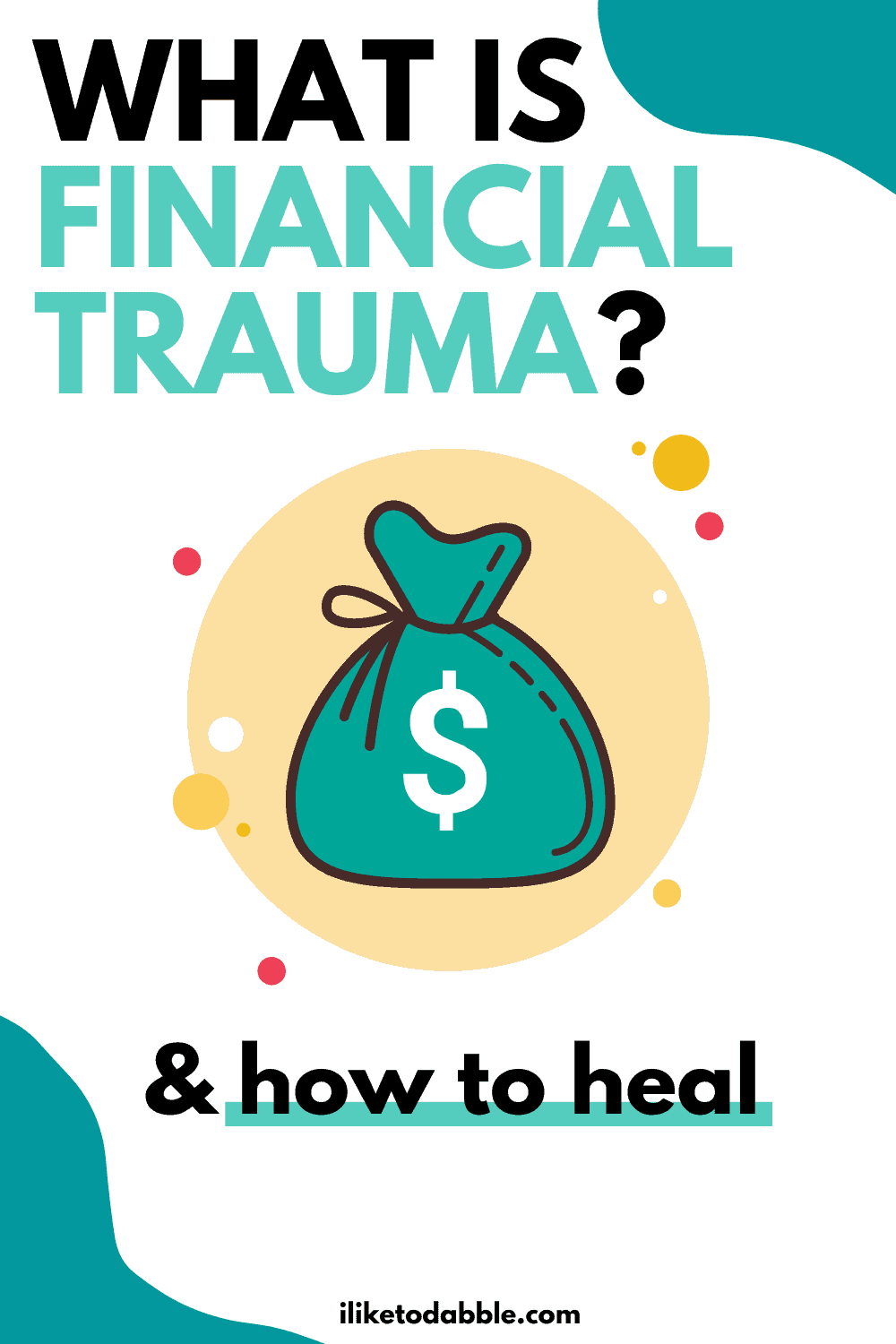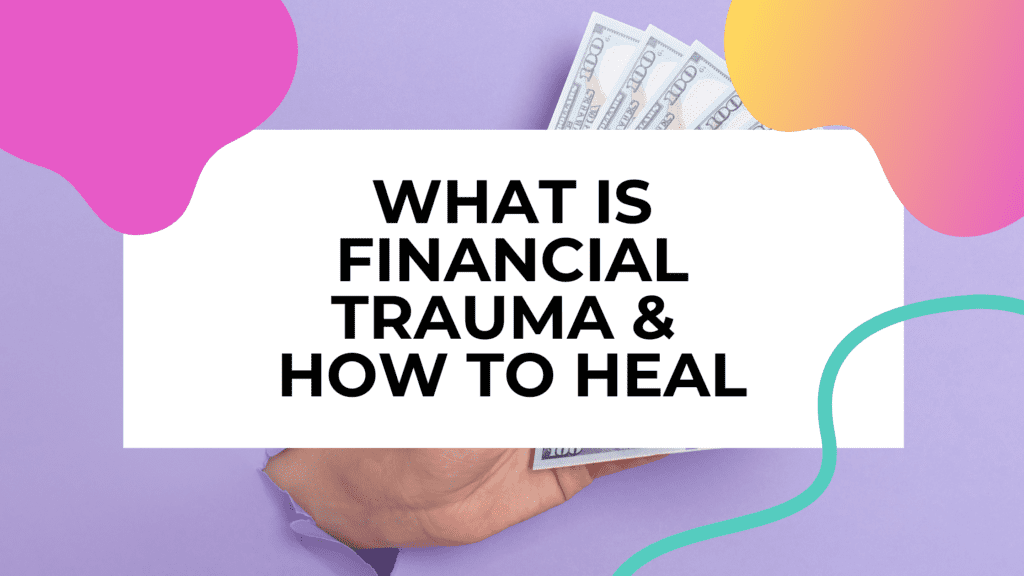Our website is supported by our users and contains affiliate links. We get paid when you purchase or sign up for anything through those links. Read the full disclaimer for more information.
Last Updated on October 31, 2022 by Daniella
One-third of millennials have experienced some form of financial trauma, according to a 2016 study from Dr. Galen Buckwalter.
It’s no wonder when millennials graduated into the great recession and then years later, a global pandemic. Now many of them struggle with rising student debt, widening pay gaps, a housing crisis, and inflation to top it off.
Their financial trauma doesn’t have to be a singulare, dramatic event either. They could experience any sort of financial stress that threatens their safety and could also be generational, intergenerational, relational, societal, or systemic.
But millennials aren’t the only folks dealing with financial trauma. Several Americans have experienced financial trauma at least once in their lives, with the LGBTQ+ community likely experiencing higher rates of financial trauma due to the discrimination they face in school, the workplace, and in society, being unhoused as a child from a family that doesn’t accept them, and other factors.
Financial trauma often intersects with other mental health issues one might experience like ADHD and PTSD — as well as racism, classism, and sexism in our society and can manifest in several ways. For example, one of these ways is imposter syndrome.
Table of Contents
What Is Financial Trauma?
Trauma is defined as an emotional response to a deeply distressing or disturbing experience. Financial trauma is when you have trauma relating to finances that can cause a toxic or disturbed relationship with money. Financial trauma could also be from your earliest memories from childhood that had anything to do with finances.
Dr. Galen Buckwalter, a research psychologist of 25 years, explains financial trauma as being “characterized as a dysfunctional reaction to chronic financial stress”.
What Causes Financial Trauma?
When we think of what is characterized as “trauma”, we often refer to deeply tragic events like a death. But it can also be caused by certain circumstances and events where there is a threat to your safety or wellbeing.
Financial trauma can be caused by any number of things, including (but not limited to):
- Poverty
- Being unhoused
- Inability to pay bills
- Food insecurity
- Divorce
- Bankruptcy
- Evictions
- Financial abuse
- Medical debt
- Student debt
- Credit card debt
- Aggressive debt collection
- Identity theft or regular theft/robbery
- Falling victim to financial scams, MLMs, and pyramid schemes
- Job loss and other types of work trauma
- Being underpaid
- Discrimination
Financial trauma can even be generational when you experienced a parent that had a negative relationship with money, and you start to mimic that behavior.
Symptoms of Financial Trauma
If you often ruminate on failure or have a negative emotional response to basic thoughts about money, you might have some financial trauma that you haven’t processed.
There are several symptoms of financial trauma actually. Some of these include financial avoidance, impulsive spending, compulsive shopping, hoarding, workaholism, and lack of boundaries.
These symptoms can manifest in the fight, flight, freeze, or fawn responses.
Fight Response
A fight response is an act of self preservation. It includes healthy reactions like creating boundaries, being proactive and assertive, and being a strong leader. When someone has been exposed to intense trauma over time, the response can become unhealthy and manifest in controlling behaviors, bullying, and demanding perfection from others.
An example of a healthy fight response would be if someone at work asked you to work extra unpaid hours during the weekend and you respond with “I respectfully cannot take on unpaid work. If you’d like to discuss this further, I would be happy to include Human Resources in this discussion”.
An example of an unhealthy fight response would be that same scenario but instead of the former response you gave, you instead respond with something that could be personally insulting to the requestor.
Flight Response
A flight response happens when something seems impossible to fight, one may decide to remove themselves from the situation entirely.
In healthy situations, a flight response can help you disengage from harmful conversations and leave unhealthy relationships. On the flip side, an unhealthy flight response can lead to obsessive tendencies, needing to stay busy at all times, constant fear, and workaholic tendencies.
An example of a healthy flight response is when you leave an abusive partner.
An example of an unhealthy flight response would be when you don’t leave an abusive partner but live in constant fear so you distract yourself by staying busy at all times, as an attempt to escape the perceived danger.
Freeze Response
A freeze response is when people literally freeze up and pause when faced with danger.
A healthy freeze response can look like mindfulness, awareness, and being fully present in the moment. An unhealthy freeze response can cause you to disassociate, isolate, and have difficulty making decisions or trying new things.
An example of a healthy freeze response is when you are presented with a side hustle idea. You pause to be mindful of the opportunity and if it’s right for you, as well as increase your awareness through research before diving in.
An example of an unhealthy response to a new side hustle idea could be the difficulty to make a decision to move forward with it and the fear of trying that new idea, even though it seems interesting to you after you’ve done research on it.
Fawn Response
Fawning is the least known trauma response. It’s primarily linked to people pleasing. People who spend a lot of time around toxic people will go above and beyond to please the toxic person in an attempt to neutralize the threat.
A healthy fawn response could manifest as compassion for others, compromising, and trying to be as fair as possible. An unhealthy fawn response manifests as codependent relationships, loss of self, and people pleasing to the point of destruction.
An example of a healthy fawn response would be compromising with a boss about certain expectations on a project.
An unhealthy example of a fawn response is staying at a job with a toxic boss, going above and beyond for that boss, and people pleasing your boss at the expense of your mental health and career. This could also intersect into some work trauma that you’ve experienced in the past, or are currently experiencing.
How to Cope With & Heal Financial Trauma
Coping and healing from financial trauma starts with looking inwards and getting in tune with your behavior.
Pay attention to how you interact with money, including financial situations and discussions about money. Track your emotional responses when you think of how you spend money, save money, and even how you make money. If you get emotionally triggered by something, that gives you a sign that it might be connected to something else in your past.
What comes up when that emotional trigger happens?
Journaling, talking to others in your life about money, therapy, and methods like EMDR (Eye Movement Desensitization and Reprocessing) can help you access and process past life experiences. You can also talk to others in your life that you can trust and you feel like they won’t judge you — like a partner, friend, or family member.
Throw out the idea that money is “taboo” and shouldn’t be talked about. That only adds fuel to any current money trauma — that it’s something you should ashamed of. Normalize talking about money in your household, with your partner, and even your friends.
The journey to healing is not linear, but it starts with awareness and support. The more supported you feel, the more action you can take.
Related articles:
- What Is Financial Therapy?
- What is Economic Abuse and How to Recover
- LGBTQ+ Career Resources
- LGBTQ Books to Help Navigate Money, Work, & Beyond
Pin it for later!


Daniella is the creator and author of iliketodabble.com. When their wife Alexandra and them aren’t globetrotting or playing with their 7+ animals, they are dabbling and working towards a future of financial freedom.

